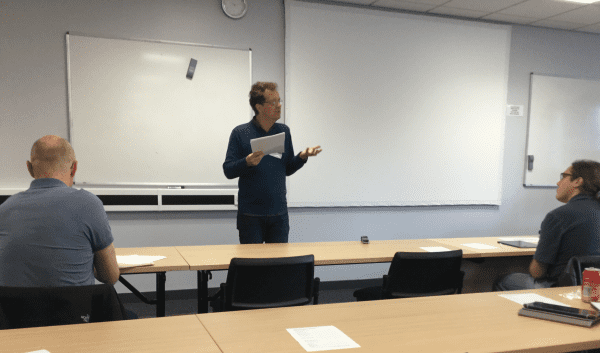
By Hamish Johnston
Why is quantum physics so hard to write about?
That was the theme of George Musser’s keynote talk at a seminar for science communicators held this week at the University of Leeds. Musser – who has written extensively on topics such as quantum entanglement and string theory – gave several reasons and here are a few that stuck in my mind.
One reason is that reaching an understanding of what you are writing about can be very time consuming. I have been writing about quantum mechanics for over a decade, I couldn’t agree more. Even covering a small piece of research often involves taking several steps backwards and reviewing the fundamentals of quantum theory.
A question I face on Physics World is should I share this background information with the reader, or assume that they already have the required knowledge? I tend to go for the former because the background to an exciting piece of research is often as interesting as the breakthrough itself. And there’s also the old maxim that physicists love to be told what they already know!
Musser also pointed out is that research papers on quantum mechanics can be very confusing. I agree to a point. I can certainly think of two high-profile general science journals that are prone to publishing papers on quantum physics that can be incomprehensible. However, I do think that papers in leading physics journals tend to be much more accessible – at least to physicists. But feel free to take this with a grain of salt, because I do work for a physics journal publisher.
Musser also says that interacting with quantum researchers should be a two-way process, rather than the journalist simply asking questions and recording the answers. Although such interactions take time, I think this is very good advice.
It’s very likely that the first answer you get to a question will be incomprehensible. This is not a reflection of the intellectual ability of the journalist, nor a slight on the physicist’s ability to explain their work. It’s just that difficult concepts are rarely understood the first time around.
Musser’s advice – against good journalistic practice, he points out – is to move things forward by prompting the interviewee with your own interpretation of the quantum physics in question. Ultimately it is your interpretation that you will be presenting to your readers, so why not get a sanity check? If you are worried about bias creeping into your article, you can always get a second opinion from another quantum expert.
And when it comes to experts, who should you trust? Does the proponent of a new and controversial theory express some doubt about their idea? If so, that’s someone you can believe in, says Musser, adding that having no doubt is a very bad sign. Indeed, Musser points out that most new ideas in physics tend to be wrong, that’s just how science works.



